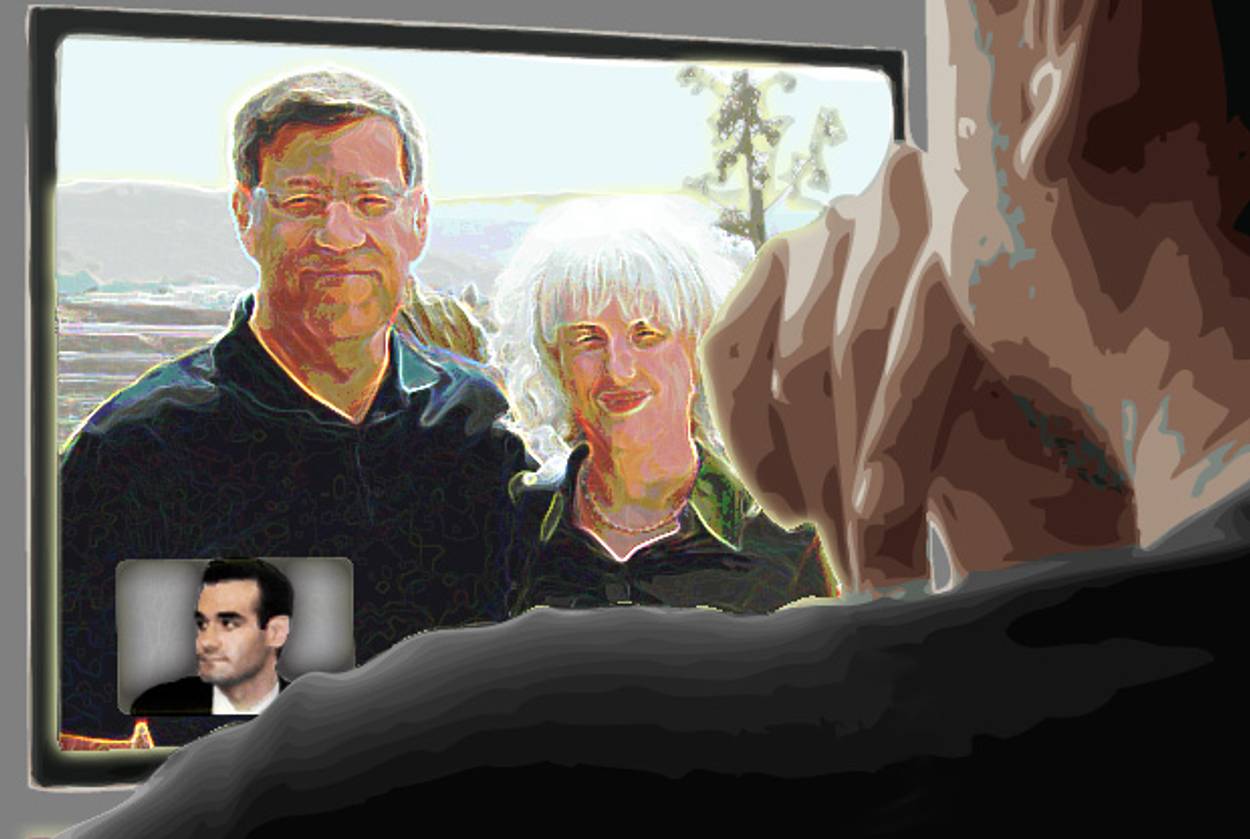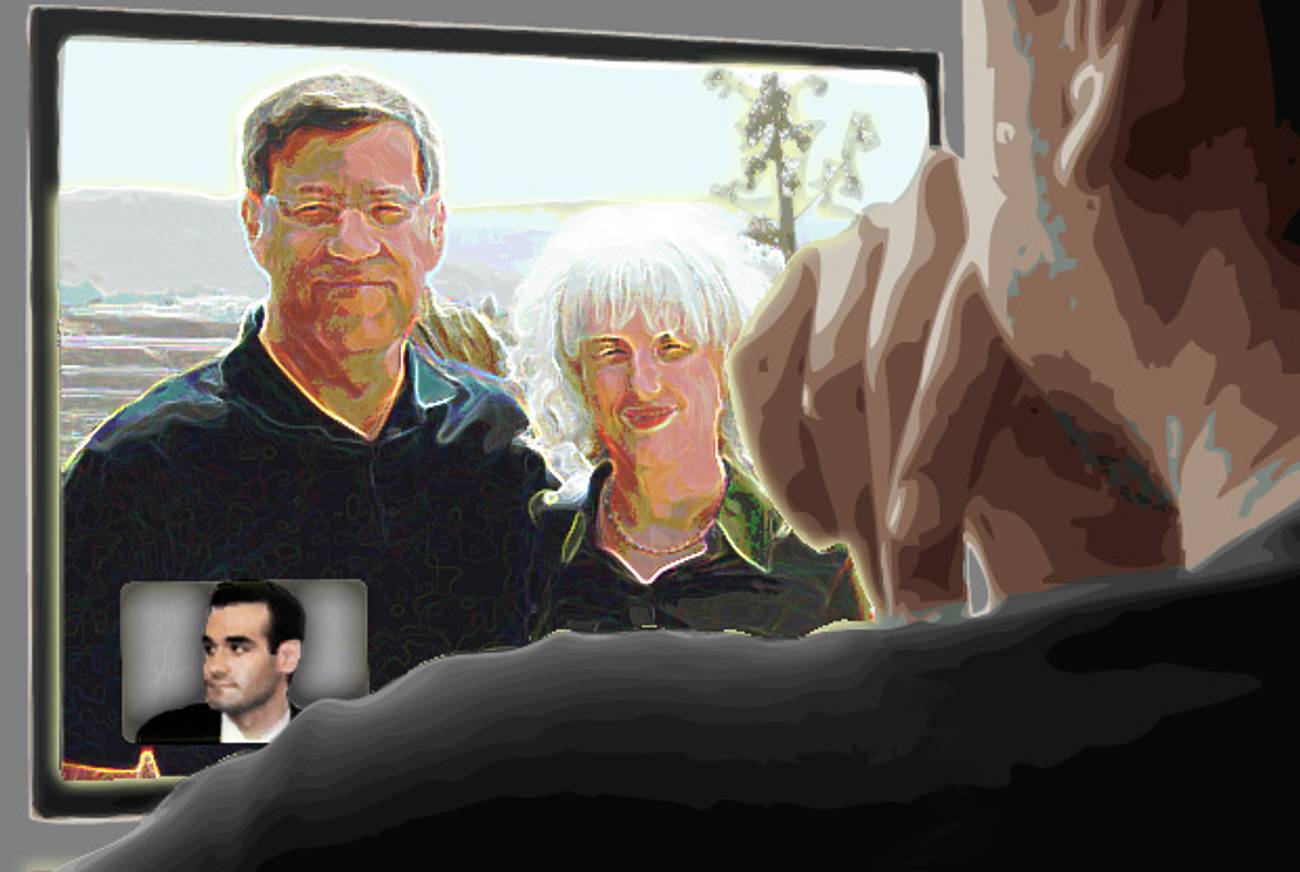Israel Made My Parents Cool
When I was a kid, my folks were ordinary suburbanites. Then they retired, made aliyah, and got hip.




Two years ago this week, my parents made aliyah, which is Hebrew for “abandoned me.” And then something weirder happened: They became cool.
When my parents left America, they were objectively not cool. My dad’s definition of style was a polo shirt with Bugs Bunny on the pocket—judging by frequency of use, his favorite piece of clothing ever. My mom’s idea of going out was … just an idea. “Going out” in my family consisted of a strange game of verbal tennis where the paternal unit would serve with “What do you want to do?” and Mom would return with “I don’t know, what do you want to do?” My sister and I would sit on the sidelines, heads turning side to side, as they volleyed ideas about restaurants we could go to before dropping each one. Our mouths would salivate as we discovered Mom’s apparently endless cooking repertoire, as evidenced by her response to the suggestion of any cuisine: “I can make that at home.”
My dad, an avid photographer, has abundant evidence that my parents used to be cool before my sister and I showed up and ruined things. In the 1970s, my mom looked gorgeous as a young college student, and my dad rocked a three-piece suit and facial hair that would put Teen Wolf to shame. They even smoked things like cigarettes and … let’s say, salmon.
But my sister and I suspected those photos were posed. My dad’s most famous “war story” was that he had a friend in high school who could burp the word “Constantinople.” My mom’s stories seemed to begin and end in the ’70s, when she spent four years at the Stern College for Women. By the 1990s, their idea of “going crazy,” as we saw it, meant shopping with abandon at the Bead Stampede or Home Depot or throwing an extra pair of Kirkland Signature pants into the cart at Costco.
To be fair, my parents were fun; I became a comedian from years of having to keep up with the rapid banter at our dinner table. And my parents were great and loving: We always ate dinner together, and they were always there for us, for which we were of course completely ungrateful. But they weren’t cool. They just seemed old. My mom took enough vitamins to revitalize a sick horse. My dad rode his stationary exercise bike in baggy Lands End boxer shorts, forever ruining the basement for me.
And then it happened. These two old farts who never ventured far from home (Miami doesn’t count as travel for Jews) decided to go to Israel, “just to look,” and came back owning an apartment. My sister and I were shocked. Before that moment, my parents’ idea of risk was mixing a new salad dressing right into the lettuce—and they always had back-up lettuce. They were not the type to move their entire lives across the world.
At first, we didn’t believe it. We were sure they’d change their minds. And then, the house where we grew up was sold. My mom sat on the floor of her empty bedroom where their furniture had been for 20 years, the longest she’d lived anywhere. Her eyes welled up with tears and she cried like I’ve never seen my mom cry. It was real. Life in Teaneck, N.J.—not that I’m admitting here that there is life in Teaneck—was over.
In August 2010, my parents became Israelis. I watched them be welcomed by Prime Minister Netanyahu via web stream. They looked goofy, as usual, a little too proud of their complimentary tan caps provided by Nefesh b’ Nefesh, and I wanted my goofy parents to come back home. Of course, those Israelis had big signs up saying “Welcome Home,” confusing these old, sleep-deprived people as to where “home” was. I regretted all my years of Zionism and flag waving and marching in parades. That damn country stole my parents.
Very soon, living in Israel changed them. My dad became friendly with the Israeli equivalent of the Pimp My Ride guys, who have installed all sorts of aftermarket gadgets into his Prius—which is what he drives when he’s not on his carbon-fiber racing bike. My mom and her friends hang out regularly at cafés, and they even go to restaurants; no more talk about how she “could make that at home,” even though they’ve got a sleek new European-style kitchen complete with a cappuccino machine. They’re always having guests over or crashing at someone else’s pad, like a bunch of college backpackers. They just uploaded photos to Facebook of them barbecuing with 20-year-old soldiers. My parents rarely have time to stay on the phone these days because they’re heading to some hip event. The other night they went out to a concert. After dark!
At first, I didn’t like this at all. I wanted my parents back. I used to know where they’d be: home. I used to know what they’d be doing: nothing. Suddenly, it was impossible to track them down. Well, actually, it was very possible, because they got iPhones! (My mom has apps!) But I missed that feeling you get when you go to your grandma’s house and see the same old sofa sitting against the wall (under the painting of the lake) and know it’ll always be the same for you. I missed that feeling of predictability. I used to want my parents to be cool. And then I realized that’s not a parent’s job. Their job is to be safe, and available, and predictable. My parents were all of those things … and then they retired. To Israel.
Now, after two years, I’ve gotten used to my new parents. I’m even happy for them. In fact, I hope that one day, I can be as cool as they are.
***
Like this article? Sign up for our Daily Digest to get Tablet Magazine’s new content in your inbox each morning.
Ari Teman is an award-winning comedian appearing on TV and in comedy clubs. He is the founder of the international Jewish volunteer network JCorps and the 12gurus:Charity conference. Follow him on Twitter at @ariteman.
Ari Teman is an award-winning comedian appearing on TV and in comedy clubs. He is the founder of the international Jewish volunteer network JCorps and the 12gurus:Charity conference. Follow him on Twitter at @ariteman.